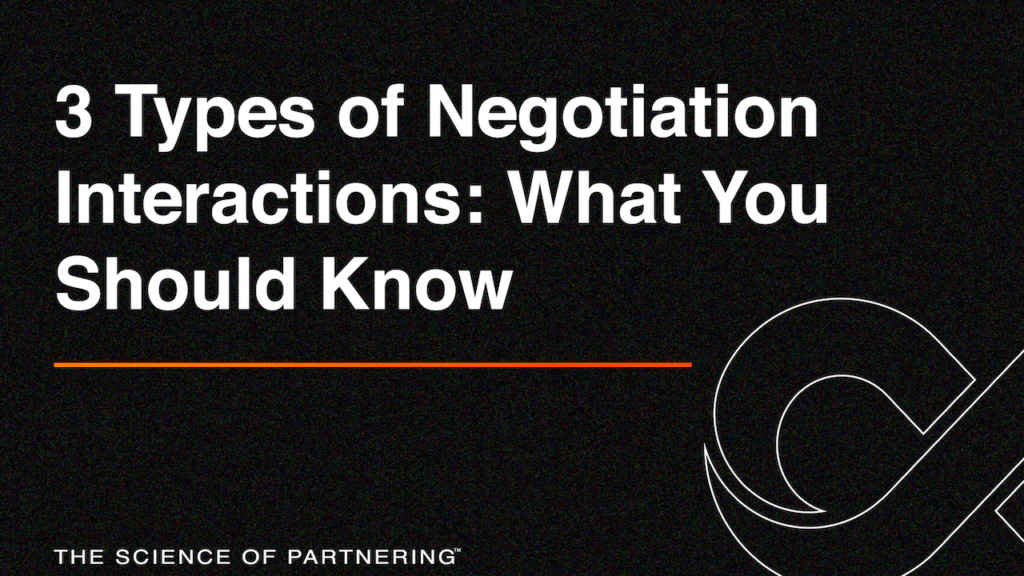All negotiations can be classified into one of three interactions, “single,” “multiple-finite,” or “infinite.” Before constructing an appropriate strategy and being able to anticipate your counterpart’s moves, you must understand the scope and timelines of your future negotiation’s interaction(s).
Single Interactions
“Single interaction” is analogous to a hockey sudden death shootout. In these cases, nobody goes home until a winner is declared. Examples in negotiation are hostage situations and bartering at a tourist flea market. These negotiations are filled with lies, deception, and manipulation. Outcomes in these duels are the epitome of zero-sum. Although the parties may attempt to build rapport with each other, it is only done so it can be used to manipulate the other and ultimately achieve a, “Yes.”
Chris Voss’ book, Never Split the Difference, is a great example of this approach. For the right person, this book can be a good resource. Voss enjoyed a great career as one of the FBI’s top international hostage negotiators. In the book, he shared a series of techniques based on his core methodology, “tactical empathy.” I have no doubt Voss is a “single interaction” negotiation wizard. By the time his counterpart understands the Jedi mind pretzel he was wrapped in, the perpetrator is stuffed in a prison cell admiring his new orange jumpsuit.
A hostage negotiator knows that he is playing a game. That is, his negotiation has only one round and he will either win or lose. If the hostage negotiator “wins” everyone lives. If he loses, someone dies. But win or lose, nobody comes back the next day to play round two. In this single-phase game, there is virtually no penalty for breaking trust. Actually, lying, manipulation, and deception are commonly used to successfully end hostage situations.
Single interactions are centered on self-interest and “winner takes all” negotiations. In the absence of true collaboration, there is no opportunity for each person to benefit from the other’s abilities. So, the net result is zero-sum; my win must come at your loss. This approach leverages a very competitive and short-sided mentality and it is the antithesis of any partnering relationship.
Multiple-Finite
“Multiple-Finite interactions” are analogous to working with a home realtor. The vast majority of your interactions with home realtors take place over several conversations and usually over several weeks, but a definite end is never too far away. When your transaction is finally complete, you are unlikely to engage the realtor for many years, if ever. It’s just the nature of buying and/or selling a home for the average person.
Your realtor only wins if you buy a property, so he has a vested interest in getting you to eventually say, “Yes.” He wants to earn your business and especially get your referrals, so relationships matter. Realtors know many conversations will transpire over the course of your short relationship, so trust-building is imperative. With limited exceptions, after you complete the purchase/sale of your property your interactions end and the probability of continual interactions is practically zero.
Because these relationships are also short-term they too are zero-sum. That is, when you are buying a home, the less you pay for a house (you win), the less your realtor earns in commission (they lose). Because some commission is better than no commission and because referrals are a realtor’s best friend, they work hard to build relationships and uphold a sound reputation. The realtor’s future benefit will not be your commission, but rather your friend or family member’s paid commission.
Infinite
“Infinite interactions” are analogous to marriages and strategic partnerships. This is not to say these relationships cannot end, but rather the parties do not know if or when they may come to an end. So, the default mindset is to treat the relationship as perpetual. This approach, unlike the two previously mentioned interactions, pays dividends to the partners if the relationship is continually nurtured.
The initial focus is not having one or both parties rush to get to a “Yes,” but rather both parties understand the importance of evaluating alignment of goals, beliefs, and communications (culture). Unlike the two previously mentioned “zero-sum” interactions, infinite interactions open opportunities for a multiplier effect. The parties can collaborate not only to grow the size of each party’s market share but can also create a paradigm shift that could grow the market itself.
The infinite approach sees the relationship as a long-term collaboration from the beginning. This understanding allows the parties to make investments for which a compounded growth can be realized, resulting in the proverbial win-win outcome.
Strategic partnerships must be symbiotic where mutual trust, respect, and value continually flow from side to side. Contract negotiations are based upon gives, takes, compromises, and value. Yes, you have a duty to professionally represent your company and its financial interests. However, as soon as your partnership agreement is signed, you have grown a new family member and your future success will be partially dependent upon your new partner’s success.
Which approach to negotiation do you engage in the most? Do you typically get the results you desire from your negotiations? Do you follow a strategy that considers these three interaction types? How do you hone your negotiation skills so you can more quickly find optional outcomes for all parties involved?
There are hundreds of books, classes, and professional training programs that teach negotiation. Unfortunately, the vast majority of those resources take a hostage negotiation approach and no consideration is given to the long-term relationship. Do you enjoy being manipulated, misled, or deceived? Of course not, and neither do others, especially partnering companies.


